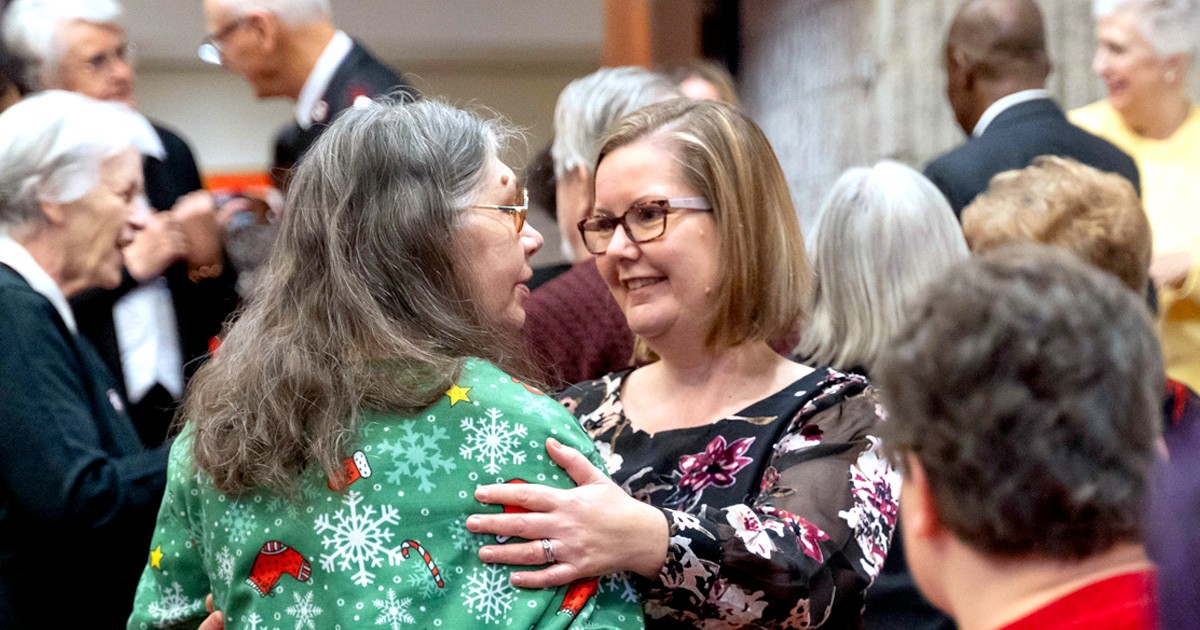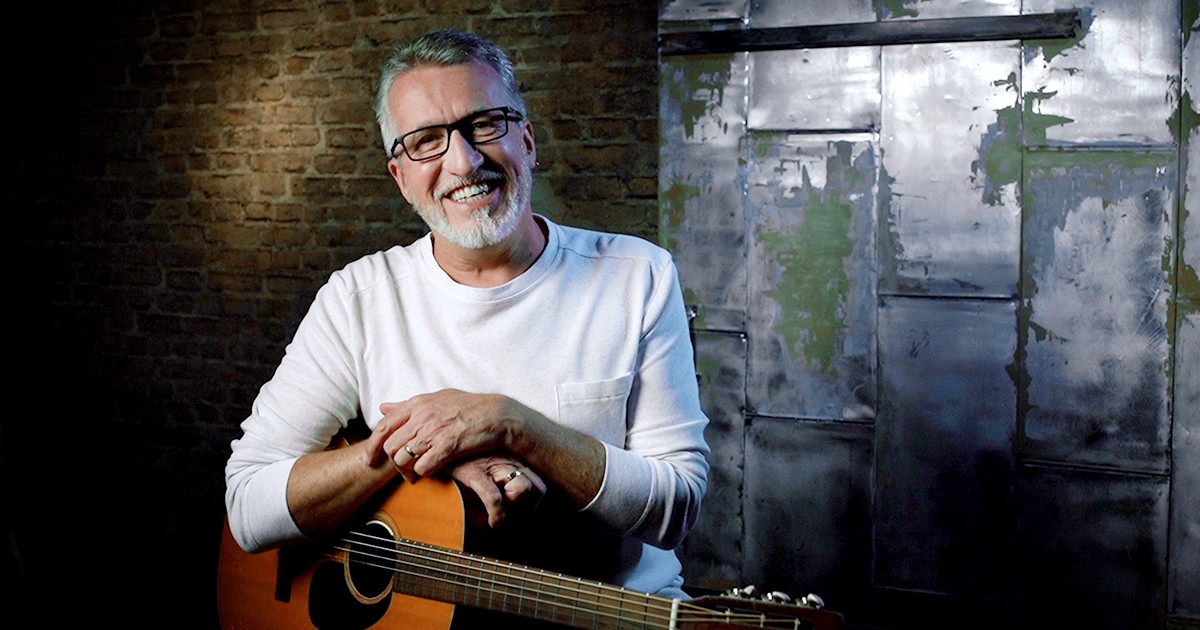 One of the inescapable realities is that we presently live in a secular, pluralist, post-modern … what? I want to say “society” or “culture,” but part of the challenge is that society and culture imply a cohesiveness that we don't know exists any longer. So, let's settle for “milieu” or “environment.” Whatever it's called, and for better or worse, Christian communities and organizations in the West now live in a milieu that no longer takes Christian values, forms and structures to be “the” way to live. What does grace have to say about this?
One of the inescapable realities is that we presently live in a secular, pluralist, post-modern … what? I want to say “society” or “culture,” but part of the challenge is that society and culture imply a cohesiveness that we don't know exists any longer. So, let's settle for “milieu” or “environment.” Whatever it's called, and for better or worse, Christian communities and organizations in the West now live in a milieu that no longer takes Christian values, forms and structures to be “the” way to live. What does grace have to say about this?
Secularism
To begin with, secularism refers to a belief in the separation of church and state. At one time many Western countries had a state church. While this has never been true in Canada, even some of the original states of the United States had “established” churches. This meant that kings and governors had a role in appointing bishops and other church officials, and in turn those church officials had a role in legitimizing the kings and governors. We can't imagine this happening nowadays. Places in the world that are experimenting with it―especially “fundamentalist Islamist states”―are reported on with some fear and enormous incredulity. Whether we come at it from the side of ordinary citizens and elected politicians or from the side of ordinary church members and ecclesiastical authorities, we will defend a division of power between state and church.
The second thing secularism refers to is what I might call a division of competencies. One field might be called temporal, the other spiritual. From time to time, a Conference of Roman Catholic Bishops has made an official pronouncement on some government policy only to be told to “tend to their knitting.” The implication is that the bishops, while they may know lots about liturgy and theology don't know enough about the issues in hand, and so they lack the competency to give any direction. “I don't tell you how to organize worship; don't you tell me how to organize the economy,” the politician says. Now, the reason the politician says anything is probably because he's afraid of the bishops' power to affect the votes of the large number of citizens who are Catholics, but his charge goes beyond the demand that church and state power be separated. The basis on which he says the bishops shouldn't “meddle” is knowledge. On the other side, but for similar reasons, there are church officials saying, “Let the church be the church.” There's something to this. Public policy experts know things good pastors don't; and vice versa.
The third, and newest, meaning of secularism refers to the claim that all matters of public policy must be defined and argued about in strictly non-religious terms, and grounded in concerns and sensibilities that are not religious in any respect. It insists that public spaces must be stripped of religious paraphernalia. And it objects to public figures using religious language. Richard John Neuhaus has described the result as “the naked public square.” It is not exactly that religion is entirely banished from an environment that is secular in this sense, but it is to be treated, in the memorable words of Stephen Carter, as “a hobby,” a personal passion that one should not expect to have a bearing on the serious issues of life. Richard Rorty, an advocate of secularism in this sense, says: “the main reason religion needs to be privatized is that, in political discussion with those outside the relevant religious community, it is a conversation-stopper. [Suppose that in a townhall meeting someone says that gaybashing should be a criminal offense because it's against God's will.] Saying this is far more likely to end a conversation than to start an argument…. The ensuing silence masks the group's inclination to say, 'So what? We weren't discussing your private life; we were discussing public policy. Don't bother us with matters that are not our concern.' ”
Pluralism
Perhaps the reason that conversations stop when religious reasons are offered for laws and other public affairs is that we live in the middle of a vast plurality of religions and cultures and philosophies nowadays, and we are trying to keep all these different people together in one political unit. Given all these differences, what language do we use to communicate with each other and arrive at collective decisions?
Another proposal for accommodating pluralism is to champion the diversity, and not try to put everyone is a big melting pot … Is there a place for Christianity “at the table”?
The idea that we should try to communicate and arrive at decisions together (which is something I strongly believe to be right) does not necessarily follow from the mere fact that there are lots of people of different worldviews living in the same place. The majority or the strongest group could try simply to use brute force to impose their sense of social order on the rest. But we recoil at that suggestion because we have accepted pluralism in a normative sense, and not just as an empirical fact. That is, we have come to believe that each of the various religions and philosophies, even those we think oddball or rather offensive, have a right to exist, and that their adherents should [not] be just bullied into going along.
Richard Rorty believes that there is enough commonality among us all that we will be able to find a way of communicating for the purposes of living together without having to resort to force. When, for example, Christians, Hindus and humanists think about health they may have lots of beliefs and values they do not share, but all of them attach some importance to bodily health and all of them think the child who has fallen down the stairs deserves medical attention. Whether we have enough such values and beliefs in common to sustain a complex society is an unsettled question.
Another proposal for accommodating pluralism is to champion the diversity, and not try to put everyone is a big melting pot. This sort of thinking probably runs at cross-purposes with the secularist elements of our environment, but it coincides with the post-modern ones.
Post-modernity
One way the Modern Age has been defined is by reference to a belief in objective, scientific rationality. People animated by the spirit of the Age of Modernism assume that all social problems can be understood by means of scientifically well-designed research projects and that, in principle at least, all social problems can be solved by the application of a rational problem-solving strategy. Where there are differences of opinion among people, the “Modern” mind takes this to be rooted in a lack of information or in personal bias and irrationality―if rational people had sufficient information they would come to perfect agreement, no matter who they were or what their religious and cultural background.
This Modern vision of things is now in doubt, to say the least; and what has succeeded it is often called Post-modernity. What “Post-modernity” means is notoriously contested (and some would say that's the way it has to be since the desire to define things exactly and thereby master them is a classic example of the Modern mind at work!). I suggest, however, that even without a definition, we can nonetheless identify some flavours of Post-modernity.
Modernity's progressive optimism has been replaced in some places by widespread doubt and cynicism. Irony is dominant in the arts—no stories work out as they are “supposed to.” “Healthy skepticism,” a term of Modernity, has been replaced by “the hermeneutics of suspicion.” Leaders and the organizations they lead are persistently suspected of hidden agendas, and their appeals to objective rationality and scientific proof may be dismissed as just one more power play.
Rightly or wrongly, the Modern Age has been portrayed as having set up as the norm for all humanity the affluent, white, European, university-trained male who speaks in scientific formulae and Esperanto. To the extent that this ideal had force, women, the poor, working-classes, the mentally ill, and people of colour felt voiceless and invisible, their sufferings and aspirations regarded as unimportant—or important only as problems to be solved in the way that leaders of the “normative” culture thought they should be solved. Now we see what is perhaps a more hopeful face of Post-modernity in the ready embrace of cultural and religious diversity that is around us, in the openness to the variety of human ways of thinking and expressing ourselves. Pluralism as diversity becomes a positive ideal for Post-modern times.
This is admittedly a sweeping overview. I don't offer it as more than that. But I offer it to make the point that we cannot talk about organizational ethics in a vacuum. We need some appreciation of context, and if my sketch has any connection with the situations in which our organizations presently live, it will have implications for the outworking of organizational grace.
“Grace” is a deeply Christian term, which Christian organizations naturally want to use in describing themselves and by which they want to guide their actions. How can they be communities of grace and secular at the same time? Won't there be a danger of selling their birthright for a mess of pottage (to draw on a biblical image) if they try to reduce all the language of Christian values to secular terms? Or on the other hand, the danger of being misunderstood and therefore cut out of the important discussions of public policy if they insist on using their Christian language only?
An organization at the crossroads is focused on the situation of the person rather than on its own importance, knows what it is to live by faith rather than foresight and believes that there is forgiveness for mistakes
This is not an idle academic speculation. In recent years, a political debate has occurred in Canada over marriage. Marriage is an “institution” with a long religious history, many Christian traditions treasuring it as a sacrament or a covenant and an image of Christ's relationship with the church. The Parliament of Canada is not ready to put any of those ideas into leglislation. What they want is a purely secular definition of marriage. If the churches are to be “at the table” for this discussion, it is assumed that they will distill from their theology a “core” concept which people of all faiths and none will be able to live with. To which some respond that there is no secular “core,” and whatever the government legislates (even if it is given the name “marriage”) will be a different thing from the institution they treasure.
I think it will sometimes be important for Christian organizations to insist on the irreducibility of their religious language, symbols, traditions, style, etc., and resist the demand that secularity be the prior condition to participation in the broader public life of the society. They may be aided in this resistance by the pluralism and post-modern multicuturalism that characterizes our times as much as secularism does, especially if they argue not only for their own right to be thoroughly and distinctively Christian, but also for the right of Jewish organizations to be thoroughly and distinctively Jewish, Muslim organizations to be thoroughly and distinctively Muslim, etc. The danger of multiculturalism as a social policy is that the society will fragment so much that it will fall apart and there will be no “table” for everyone to have a place at. This is not an inevitable outcome, however; and when the effort is set against the demand that Christian organizations sacrifice their distinctiveness to some common denominator, it's worth venturing.
In setting out on the venture we should remember that the church has always faced the challenge of “translation.” It has had to translate the Bible from Greek into Latin, Cree, Japanese and English. It has had to ask whether baptizing Saturnalia as Christmas is a sell-out. And so on. Sometimes the effort has been done well, and sometimes poorly, but as we face the challenge of secular governments and cultural pluralism there is a history for us to draw on.
In addition, I think that a disposition to make an effort to be understood by others is inherent in the Christian understanding of grace. Grace is open and hospitable, inviting rather than aggressive. We shouldn't assume that honest efforts to express Christian values in terms that others can understand will fail. After all, when the Word became flesh (God's supreme act of grace) there was a huge risk of the essentials getting lost in the translation, but they didn't: many see Jesus for who he is.
What I am saying is that Christian organizations, motivated by grace, should want to participate fully and authentically in public policy discussions and defend their place as providers of public services. They should not sell-out to do so, but they should try to demonstrate that Christian values are not for Christians only, that they can be understood widely, and that they are responded to positively even by many who would not call themselves Christian.
Irene Stickland, an outstanding healthcare executive who has led several Salvation Army hospitals, says Christians and their organizations belong where people are at the “crossroads” of life. I think this is profoundly right. People don't have to be Christian to understand the experience of being at life's crossroads. A decision has to be made, perhaps in the middle of a lot of traffic. The way forward is not necessarily the same as the way that got them there. The decision is fraught with uncertainty and perhaps fear―they could get run over. Into such an experience steps an organization that is focused on the situation of the person at the crossroads rather than on its own importance, knows what it is to live by faith rather than foresight and believes that there is forgiveness for mistakes. In other words, an organization of grace steps into the person's experience. Wouldn't it be welcomed?
The leader of a Christian organization will hear resonances in the word “cross-roads” that the non-Christian won't. Those resonances may explain why the Christian is working where she is and why she is fighting hard to defend the place of distinctively Christian organizations as providers of public services. But even without hearing those resonances, the person at life's crossroads can genuinely experience Christian grace. And isn't that what it's about?









Leave a Comment